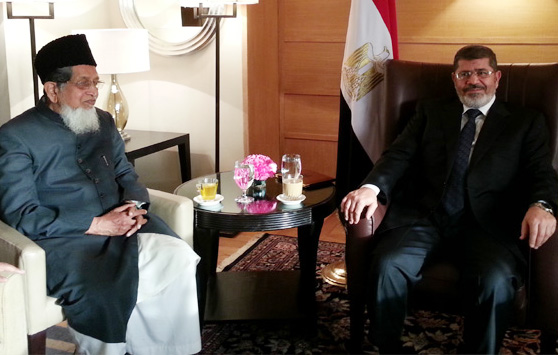
Besides Ameer-e Jamaat, other Muslim leaders who met Dr. Morsi at Hotel Sheraton here in Delhi on Tuesday evening included Jamiat Ulema president Maulana Arshad Madani, General Secretary of Jamiat Ahle Hadees Maulana Asghar Ali Imam Mehdi, Shahi Imam of Fatehpuri Masjid, Mufti Mohammad Mukarram, Jamaat media secretary Ejaz Ahmed Aslam and Rizwan Rafeeqi from Human Welfare Foundation.
During the meeting, Egyptian President Dr. Morsi and Indian Muslim leaders discussed bilateral relations between India and Egypt and issues of Indian Muslims.
Representing Indian Muslims, Ameer-e Jamaat Maulana Jalaluddin Umri welcomed Dr. Morsi in India. He said that India and Egypt have decades-old relations and we hope that restoration of democracy in Egypt and election of a wise person as president would strengthen the bilateral relations between the two countries. For different historic reasons, Indian Muslims have always felt close to Egypt. Ameer-e Jamaat expressed hope that the efforts of President Morsi to resolve the Palestinian issue will get success.
Talking to the delegation of Indian Muslim leaders, President Morsi said Muslims have a long history in India, they should present a good example before the country by their character. He urged upon the Indian Muslim leaders to focus on education and moral upbringing of the new generation.
Dr. Morsi expressed concern on the situation in Syria, Palestine and Myanmar and stressed on the peaceful resolution of their issues. Commenting on the present situation in Bangladesh and conviction of leaders of Bangladesh Jamaat Islami, he said these are the past things, the leadership of Bangladesh should forget these things and move ahead by taking all people along.






Comments
Add new comment